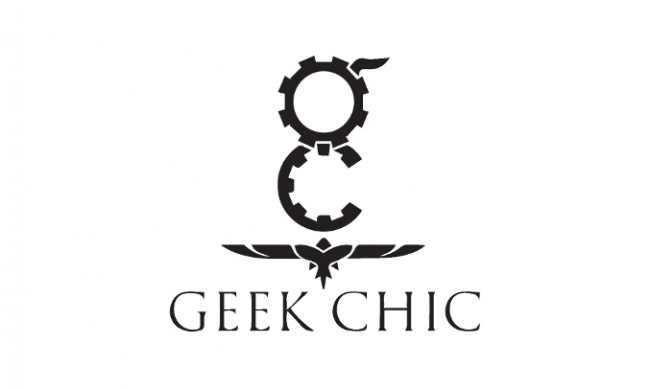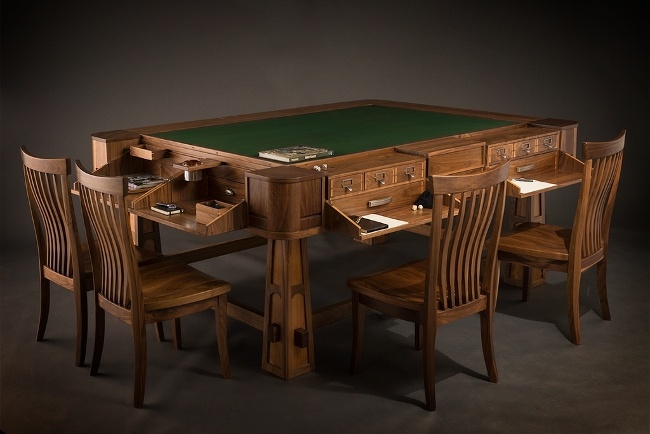Rolling for Initiative is a weekly column by Scott Thorne, PhD, owner of Castle Perilous Games & Books in Carbondale, Illinois and instructor in marketing at Southeast Missouri State University. This week, Thorne looks at the shut-down of Geek Chic and possible reasons why.
As you may or may not have heard, Geek Chic shut down its website and stopped responding to emails and phone calls around June 12. Founded in 2008, Geek Chic attracted attention by producing made-to-order, high-end gaming furniture in the United States, requiring a deposit of anywhere from $150 for an 8 hour chair to over $5000 for its top-of-the-line Sultan gaming table which cost between $20,000 to $30,000 when completed. One of the Sultans is seen in use regularly on Wil Wheaton’s TableTop webseries.
The company appeared to hit the "big time" in 2013 when founder Robert Gifford appeared on the ABC series Shark Tank seeking a $100,000 investment for a 5% stake in the business (You can watch the episode here or, if you are the sort that would rather read a synopsis than watch the whole thing, read one here). At the end of the episode, Gifford received an offer of $300,000 for a 25% stake in the business, effectively valuing Geek Chic at about $1.2 million. Unfortunately, after the show, the Shark and the Geek were not able to hammer out a final deal so the agreement fell through.
A hint of the financial difficulties the company found itself in cropped up during the Shark Tank episode when Gifford acknowledged that the company had suffered a $100,000 loss on $2 million in sales the prior year. Although companies like Amazon and Uber can, depending on investors, afford to run losses for several years or even a decade, small companies like Geek Chic cannot do so for any extended period of time. While the company made appearances at major shows like PAX and Gen Con to show off its product lines, and got regular exposure on TableTop and other Geek & Sundry shows, exposure did not appear to translate into sales. I would hazard three reasons for this:
Production costs. There is a reason production of almost all furniture sold in the US has moved to other countries. Production costs in the US are extremely high. Unless a company manages to control costs extremely carefully, those costs are going to overwhelm it.
Target market. As noted in the Shark Tank episode, furniture for gaming purposes costing several thousand dollars has a extremely limited market, a major reason why most of the venture capitalists on the program opted not to offer an investment in the company. Unlike items such as TCGs or even boardgames, the number of people who both want and can afford a Geek Chic product is tiny. Furthermore, replacement likelihood is close to nil. Once a customer has purchased a Geek Chic table, a second purchase is unlikely. It is always harder to sell to new customers than to current ones and Geek Chic’s product focus virtually guaranteed few returning customers.
Competitors and anchor points. Although both said the two companies had a supportive relationship, Carolina Gaming Tables is/was a viable competitor to Geek Chic, offering similar products at substantially lower prices. Customers could look at Geek Chic’s high-end, high-priced products for many thousands of dollars, then look at Carolina Gaming Tables’ selection of similar products, priced thousands less, and opt for those. After all, as noted earlier, there are only a limited number of customers for high-end gaming furniture and Carolina Gaming Tables says on its website that the company currently operates debt free.
The question is, now that the company has shuttered its doors, what happens to the customers who put down deposits for a Geek Chic product. I imagine that will get hashed out in bankruptcy court.
The opinions expressed in this column are solely those of the writer, and do not necessarily reflect the views of the editorial staff of ICv2.com.

Column by Scott Thorne
Posted by Scott Thorne on June 26, 2017 @ 2:09 am CT



